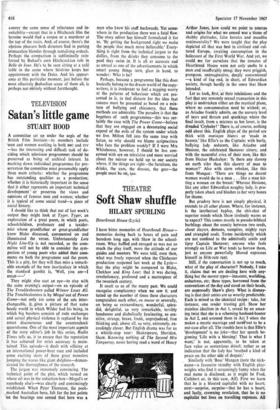Satan's little game
TELEVISION STUART HOOD
A committee set up under the aegis of the British Film Institute—its members include 'men and women working in both BBC and ITV —has the interesting and difficult task of de- ciding which television programmes should be preserved as being of archival interest. In marking down individual programmes for pre- servation the committee must presumably apply three main criteria: whether the programme has outstanding qualities as a production; whether it is historically important in the sense that it either represents an important technical development or preserves the views and opinions of famous men and women; whether it is typical of some social trend—a piece of social history. A committee set up under the aegis of the British Film Institute—its members include 'men and women working in both BBC and ITV —has the interesting and difficult task of de- ciding which television programmes should be preserved as being of archival interest. In marking down individual programmes for pre- servation the committee must presumably apply three main criteria: whether the programme has outstanding qualities as a production; whether it is historically important in the sense that it either represents an important technical development or preserves the views and opinions of famous men and women; whether it is typical of some social trend—a piece of social history.
I should like to think that out of last week's output they might look at Tyger, Tyger, an exploration of a great poem, in which poets, schoolchildren, professors and a taxider- mist whose grandfather or great-grandfather knew Blake discussed, commented on and illuminated the verses. Unfortunately Late Night Line-Up is not recorded, so the com- mittee will not be able to consider the sym- posium of young poets who added their com- ments on both the programme and the poem. This is a pity, for they will thus miss a remark- able example of the new inarticulacy in which the standard gambit is, 'Well, you see—I mean—'
They might also cast an eye—to stay with the same evening's output—on an episode of The Troubleshooters called Winner Loses All. The Troubleshooters is by Mogul out of Power Game—not only are some of the sets inter- changeable, it. gives a picture of that same heady world in which Wilder had his being, in which big business consists of rude exchanges and actual physical violence is replaced by the retort discourteous and the countercheck quarrelsome. One of the most important aspects of the story editor's job in this series, Radio Times tells us, is to ensure that the reputation it has achieved for strict accuracy is main- tained. This episode—it dealt with villainy at an international power-boat race and included some exciting shots of these great monsters jumping the waves like giant dolphins—demon- strated the thoroughness of the research.
The jargon was immensely convincing. The technical point of the plot, which turned on whose oil was in the reduction-box—Mogul's or somebody else's—was clearly and convincingly established. When Peter Thornton, the pock- marked Australian hero, felt for the hot points bn the bearings one sensed that here was a
man who knew his stuff backwards. Yet some- where in the production there was a fatal flaw. The story editor has himself formulated it for us. 'By getting the background right we make the people that much more believable.' Every- thing is right from the technical jargon to the dollies, from the drinks they consume to the pool they swim in. It is all as accurate and as unreal as one of the advertisements in which smart young things turn, glass in hand, to wonder: Who is he?
Perhaps, because a programme like this does basically belong to the dream world of the copy- writers, it is irrelevant to feel a nagging worry at the patterns of behaviour which are pre- sented in it, to feel distaste for the idea that success must be presented as based on a mix- ture of bullying and chicanery, that these methods are admirable. The paradox is that the begetters of such programmes—this was cer- tainly the case with The Power Game—believe that they are engaged on a devastating social exposé of the evils of the system under which we live. Milton fell into the same trap with Satan, so why should we blame scriptwriters who face the problem weekly? If I were Mrs Whitehouse, however, I should be less con- cerned with sex on television and more worried about the mirror we hold up to our society where, if the things are right—the furniture, the drinks, the cars, the dresses, the gear—the people must be OK, I00.


































 Previous page
Previous page